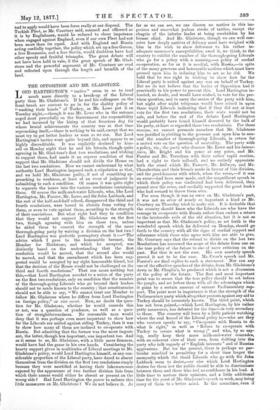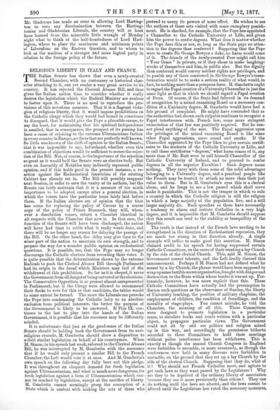THE OPPOSITION AND MR. GLADSTONE.
LORD HARTINGTON'S " tactics" seem to us to tend much more directly to a break-up of the Liberal party than Mr. Gladstone's. If he and his colleagues on the front bench are content to go in for the shabby policy of "washing their hands" of Turkey, as Mr. Lowe put it on Tuesday night,—though it was Mr. Lowe who in the autumn urged most powerfully on the Government the responsibility we had incurred by the hiring of that ferocious dog for whose brutal achievements the country was at that time reproaching itself,—there is nothing to be said, except that we must try to get better leaders as soon as we can. But Lord Hartington's tactics went quite beyond this, and appear to us highly discreditable. It was explicitly declared by him- self on Monday night that he and his friends, though quite agreeing in Mr. Gladstone's first two resolutions, and wishing to support them, had made it an express condition of that support that Mr. Gladstone should not divide the House on the last two resolutions. Now we cannot understand by what authority Lord Hartington imposed such a stipulation as that, and we hold Mr. Gladstone guilty, if not of something ap- proaching to weakness, at least of an error of judgment in submitting to such a condition. Of course it was quite right to separate the issues into the various resolutions containing them. Of course the milk-and-water Liberals, who, like Lord Hartington, Mr. Forster, Mr. Lowe, and Sir John Lubbock, and the rest of the half-and-half school, disapproved the third and fourth resolutions, were bound to abstain from voting for them, or even to vote against them, according to the strength of their convictions. But what right had they to condition that they would not support Mr. Gladstone on the first two, though agreeing with him on these two, unless he aided them to conceal the strength of the more thorough-going party by waiving a division on the last two ? Lord Hartington was perfectly peremptory about it :—" The advice which I gave to the honourable baronet, the Member for Maidstone, and which he accepted, was distinctly based on the understanding that the first resolution would be moved, that the second also would be moved, and that the amendment which has been sug- gested would be accepted by my right honourable friend, but that the decision of the House would not be challenged on the third and fourth resolutions." That can mean nothing but this,—that Lord Hartington acceded to a union of the party on the first two resolutions, only on condition that the number of the thorough-going Liberals who go beyond their leaders should not be made known to the country ; that constituencies should not be able to say, " We cannot trust our Member to follow Mr. Gladstone where he differs from Lord Hartington on foreign policy," or rice versci. Now, no doubt the ques- tion for Mr. Gladstone, whether he would concede this or not, was a question of prudence, as well as a ques- tion of straightforwardness. No reasonable man would deny that it was perhaps even more important to show how far the Liberals are united against aiding Turkey, than it was to show how many of them are inclined to co-operate with Russia. But admitting that the former was the more import- ant, the latter, though less important, was important too. And as it seems to us, Mr. Gladstone, with a little more firmness, would have had the game in his own hands. Considering the hearty support given in multitudes of Liberal meetings to Mr. Gladstone's policy, would Lord Hartington himself, or any con-
siderable proportion of the Liberal party, have dared to absent
themselves from the division on the first two resolutions simply because they were mortified at having their lukewarmness exposed by the appearance of two further division lists from which their names would either be absent or present on the wrong side V Had Lord Hartington the power to enforce this little manoeuvre on Mr. Gladstone ? We do not believe it. As far as we can see, we can discern no motive in this im- perious and somewhat jealous stroke of tactics, except the chagrin of the inferior leader at being overbidden by his former chief. And Mr. Gladstone, though we can well con- ceive how deeply motives of delicacy must have weighed with him in the wish to show deference to his rather in- adequate successor's susceptibilities, owed it, we think, to the country to exhibit the number of the thorough-going Liberals who go for a policy with a meaning,—a policy of cordial co-operation, so far as it is needful, with Russia,—in spite of the many generous and honourable motives which must have pressed upon him in inducing him to act as he did. We hold that he was right in wishing to show how far the Liberal party is united against any war on behalf of Turkey. But we do not believe that the leader of Opposition had it practically in his power to prevent this. Lord Hartington in- tended, no doubt, and would have wished, to vote for the pre- vious question, and to carry the centre of the party with him, but night after night telegrams would have rained in upon these tepid Liberals indicating that if they did not at least vote for the first two resolutions, their seats would not be safe, and before the end of the debate Lord Hartington would probably have found himself deserted by the bulk of his party, at least as regarded these two resolutions. For these reasons, we cannot persuade ourselves that Mr. Gladstone was justified in yielding to the pressure put upon him to con- ceal the number of thorough-going Liberals, in return for a united vote on the question of neutrality. The party with a policy, viz., the party who disavow Mr. Lowe and his laissez- faire, Mr. Bright and his peace at any price, and Mr. Forster and Mr. Trevelyan with their rather vapid caution,
had a right to their and we entirely appreciate both the stand which Mr. Fawcett, Mr. Dill wyn, and Mr. Chamberlain and their friends made in favour of this division, and the good-humour with which, when the error,—if it was an error—had been once made, and the magnificent speech in which their policy was vindicated had been delivered, they passed over the error, and cordially supported the great leader who had seemed to throw them over.
For even though it was an error on Mr. Gladstone's part, it was not an error of nearly so important a kind as Mr. Courtney on Thursday tried to make out. It is desirable that the country should know who the Liberals are who have the courage to co-operate with Russia rather than endure a return to the intolerable evils of the old situation, but it is not so important as that Mr. Gladstone's policy, as set forth in the wonderful speech which he delivered on Monday, should go forth to the country with all the signs of cordial support and adherence which those who agree with him are able to give. Mr. Courtney says that the refusal to divide on the last two Resolutions has narrowed the scope of the debate from one on the true policy of the future to one of mere criticism on the past. But that is not the case. His own masterly speech proved it not to be the case. Mr. Cross's speech and Mr. Forster's are final replies to such a statement. Nor can any one of the effective speeches of the debate, from Mr. Gladstone's down to Mr. Chaplin's, be produced which is not a discussion of the policy of the future. The first and most important point was to secure that the true policy should be set before the people, and set before them with all the advantages which it gains by a certain amount. of earnest Parliamentary sup- port. The point next in importance is that the strength of the Parliamentary party which altogether protests against any aid to Turkey should be accurately known. The third point, which has not been gained,—which Lord Haitington, by his rather petty manoeuvre, has defeated for the time—is very secondary to these. The country will learn by a little patient watching where the real kernel of the Liberal policy is,—who are they who venture openly to say, " Co-operate with Russia to do what is right," as well as " Refuse to co-operate with Turkey to secure what is wrong ;" and who, by so say- ing, really keep their more milk-and-water comrades, with no coherent view of their own, from drifting into the party who talk vaguely of " English interests " and of Russian aggressions. But for the present, there is perhaps no par- ticular mischief in permitting for a short time longer the anonymity which the timid Liberals who go with Sir John Lubbock seem to desire,—or else which Lord Hartington desires for them lest the public should be able to discriminate
between them and those who feel no confidence in his lead. A little time to mature their opinions, and a little additional time for the yeast of Mr. Gladstone's speech to work, may bring many of them to a better mind. In the meantime, even if Mr. Gladstone has made an error in allowing Lord Harting- ton to veto any discrimination between the Harting- touian and Gladstonian Liberals, the country will at least have learned from the miserable little wrangle of Monday night what to think of the half-heartedness of Lord Hart- ington, where to place the maximum and minimum points of Liberalism on the Eastern Question, and to whom to look as the nucleus of a stronger and more logical party in relation to the foreign policy of the future.



































 Previous page
Previous page